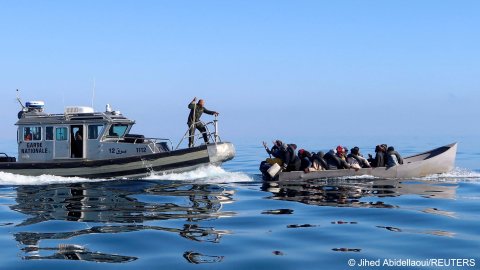Coast Guards Accused of Leaving Migrants Behind in Mediterranean
In recent developments, the humanitarian organization SOS Mediterranee has raised serious concerns regarding the actions of Tunisian and Italian coast guards, alleging that they may have left four migrants behind in the perilous waters of the Mediterranean Sea. This incident highlights ongoing challenges in managing migration and the responsibilities of coast guards in safeguarding human lives.
The Context of Mediterranean Migration
The Mediterranean Sea has long been a critical route for migrants seeking safety and a better life in Europe. Many of these individuals are fleeing conflicts, persecution, or dire economic conditions in their home countries. The journey is often fraught with danger, and the role of coast guards is pivotal in conducting rescues and ensuring the safety of those at sea.
Key points regarding Mediterranean migration include:
The Allegations Against Coast Guards
According to SOS Mediterranee, during a recent rescue operation, the Tunisian and Italian coast guards allegedly did not act promptly to assist a group of migrants in distress. Reports suggest that four individuals were left behind as the rescue mission concluded. This has ignited a fierce debate over the operational protocols of coast guards and their obligations under international maritime law.
Implications of these allegations:
Humanitarian Response and the Role of NGOs
Organizations like SOS Mediterranee play a crucial role in advocating for the rights and safety of migrants. Their efforts often complement the work of coast guards, especially in situations where national authorities may be overwhelmed or unable to respond adequately. The organization’s mission underlines the importance of humanitarian action in the face of bureaucratic challenges.
Several critical areas of focus for humanitarian organizations include:
The Broader Impact on Immigration Policies
The allegations and ongoing incidents in the Mediterranean have broader implications for immigration policies across Europe. As countries grapple with the influx of migrants, the responses of coast guards and national governments are often scrutinized. The tensions surrounding migration are compounded by political rhetoric and public opinion, which can influence policy decisions.
Key considerations for policymakers include:
Conclusion
The allegations against the Tunisian and Italian coast guards serve as a stark reminder of the complexities and challenges surrounding maritime migration. As the situation in the Mediterranean continues to evolve, it remains crucial for all stakeholders—governments, NGOs, and international bodies—to work collaboratively to ensure the safety and dignity of those seeking refuge.
The global community must remain vigilant and responsive to the ongoing humanitarian crisis, advocating for reforms that uphold the values of compassion and responsibility. It is essential for coast guards and immigration authorities to prioritize the lives of individuals who risk everything in search of safety and a brighter future.










